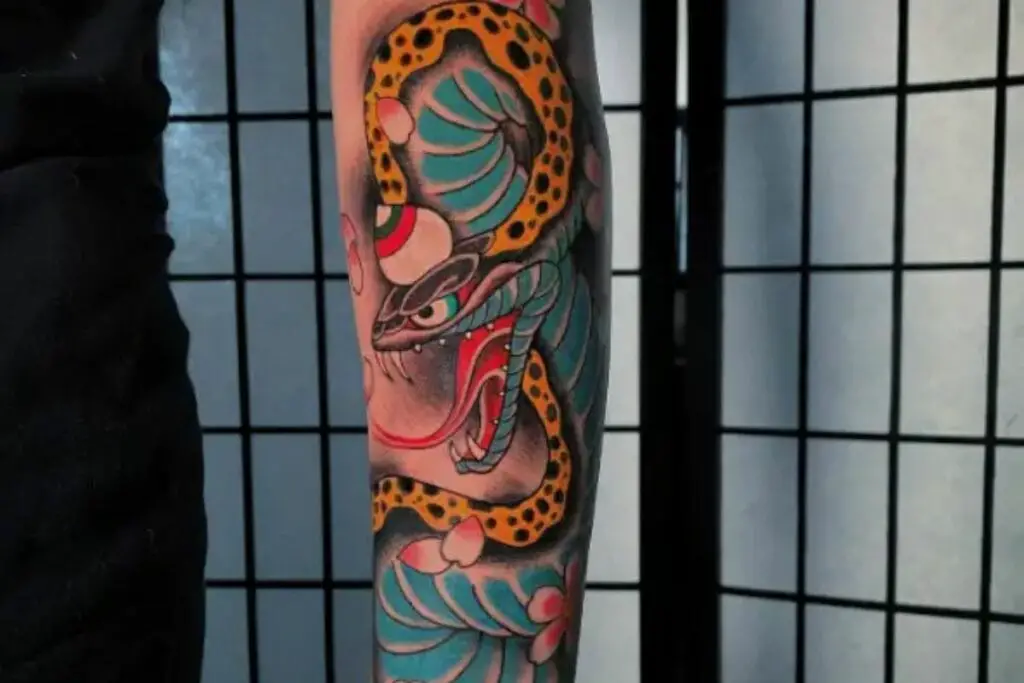
I'd say across the board, Japanese-style tattoos are my favorite to do. They're just really dramatic-looking and use a lot of bold colors. Plus, I like how they use a lot of interesting Japanese motifs, like Hannya masks and yokai. This is what drew me to learning how to master these tattoos while I was still working in Shibuya.
Naturally, the symbolism behind Japanese tattoos differs depending on the motif you do: a Hannya mask tattoo can represent rage and intense emotion, while a crane can mean prosperity. So, I thought it might be a good idea to take a look at all the different ways that you can go about Japanese tattoos and their different meanings!
Before I get started, keep in mind that a lot of the tattoos I've run through include important Japanese cultural symbols, so I'd recommend that you research them first so that you don't accidentally disrespect them.
Dragons worldwide are seen as mighty beasts. But at the same time, they are known for being wise creatures in Japan. As a tattoo, you can get a dragon to emphasize being both wise and strong.
As dragons are long and serpentine, I'd also say they're the perfect design element for an arm or sleeve tattoo - you can have them stretch across all that space nicely.
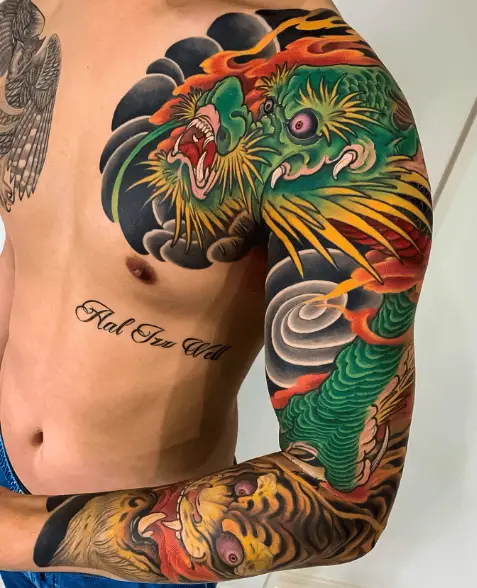
Image by @japanese.ink via Instagram

Image by @crossedkeyssociety via Instagram

Image by @threekingstattoo via Instagram

Image by @obsidiantattoocollective via Instagram
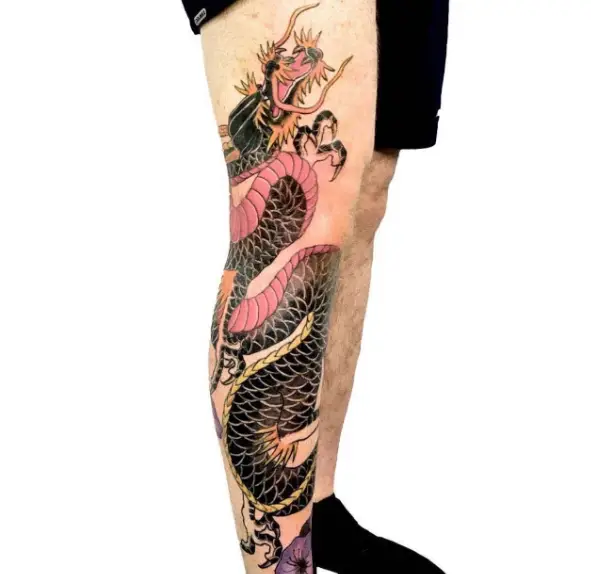
Image by @primitivetattoo via Instagram
Koi fish are popular symbols in Japan for change and transformation. I also recently found out from a client that they're respected for being able to swim upstream, making them the perfect tattoo art choice if you want to showcase how strong you are.
In Japanese culture, there's this popular tale of a koi fish turning into a dragon. For your Koi fish tattoo, you can definitely pay tribute to it and get a koi fish turning into a dragon too.
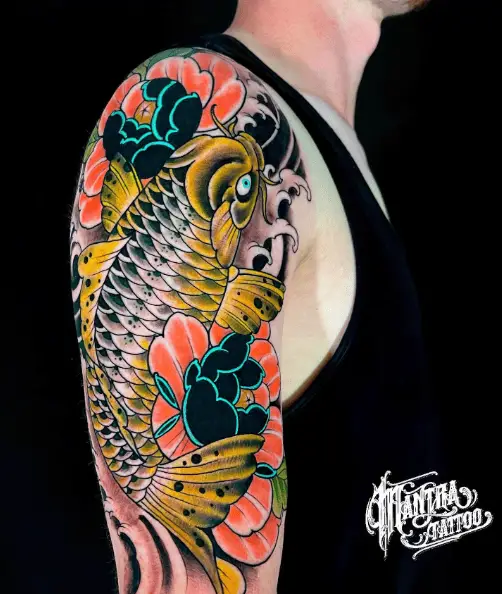
Image by @mantratattoo via Instagram

Image by @spidermurphystattoo via Instagram
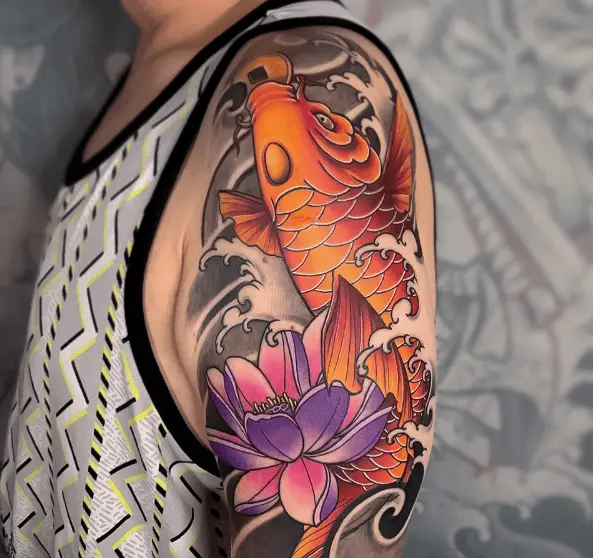
Image by @qubiduu via Instagram

Image by @necropolistattoo via Instagram

Image by @japanese.ink via Instagram
Samurai were these fierce warriors who were military nobility in medieval Japan. They were known for their heroism, meaning that you can get a samurai tattoo to emphasize how courageous you are.
On top of being these valiant warriors, samurai are also known for their discipline - it takes a lot of patience and training to get to their level, which a tattoo of them can represent.
But if you know anything about samurai, you'd also know that they did have a dark side to them, which you can highlight with your tattoo - I mean they did use to cut people in half to test their blades.

Image by @tadashitattoovn via Instagram

Image by @crisp_ink via Instagram
The Maneki Neko is an iconic Japanese figure known for bringing good luck and fortune. All around, I think that they're pretty cute looking too, as they're these cartoonish cats. What's fun is that depending on their color, they can also represent different luck and fortune, like a blue Maneki can mean good health, while a pink one can mean romance.
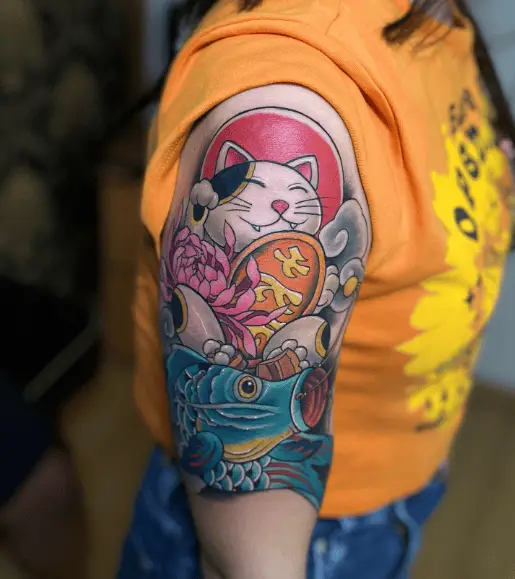
Image by @davidbrito037 via Instagram

Image by @tattoosnob via Instagram
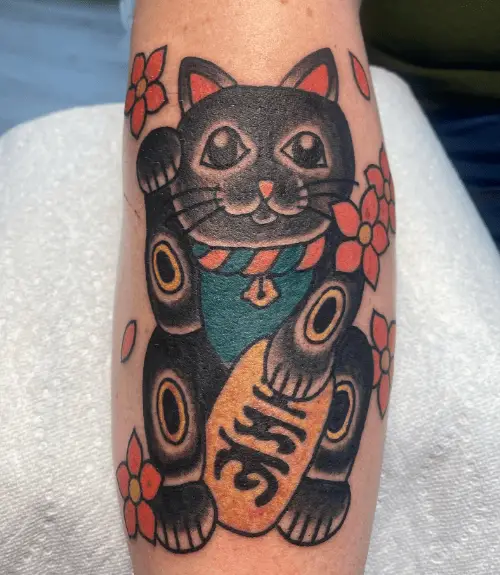
Image by @bj_zieger via Instagram
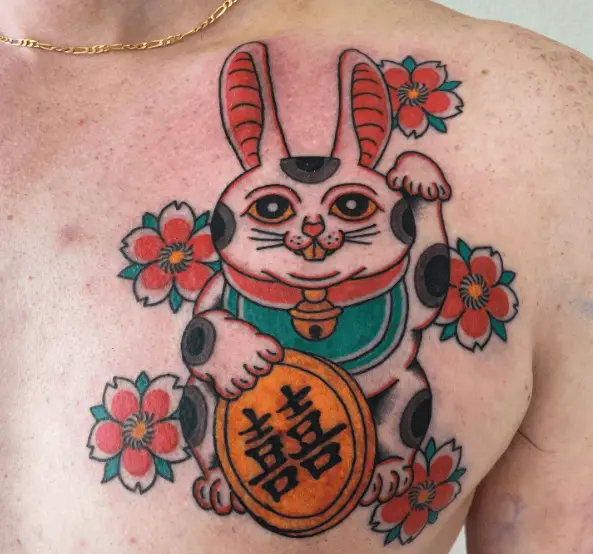
Image by @inkanddaggertattoo via Instagram

Image by @safitattoos via Instagram

Image by @ via Instagram
While back in Japan, I used to see Koimanu statues at the entrance of Shinto temples all the time. They're supposedly guardian spirits, being able to ward off evil. This makes a Koimanu traditional Japanese tattoo an interesting choice if you want to keep bad energy at bay.
They're also pretty fierce-looking if you have to ask me, making a Koimanu tattoo a creative way to tell people you're not someone to be messed with.

Image by @threekingstattoo via Instagram

Image by @wonderlandtattoophuket via Instagram

Image by @tattoosnob via Instagram

Image by @bad_apple_tattoo via Instagram
Yokai are Japanese spirits that come in a bunch of forms, like Tengus which are turtle-like spirits, and Kitsunes which are mischievous fox spirits. Yokai are usually mischievous but they can also be evil. So depending on which Yokai tale you like, you can honor it by making it the star of your Japanese tattoo.
The last Yokai tattoo I did was this Kitsune tattoo - the client was one of my regulars, and she wanted a Kitsune sleeping on her forearm. I thought it looked really cute, so maybe you can go this route too.

Image by @akostattoo via Instagram

Image by @marlostattoos via Instagram

Image by @onemanriet via Instagram

Image by @rodrigo_canteras via Instagram
Cranes are major Japanese symbols of fortune. But they also are known to be monogamous for life, making them a good inclusion to traditional Japanese tattoo designs to highlight a committed relationship in your life.
I've done a few different crane tattoos before, and a couple of the clients I've worked with have wanted the bird to be flying, with other Japanese motifs in the background like Mt. Fiji.

Image by @lizardsskintattoos via Instagram

Image by @matttelfordart via Instagram

Image by @black13tattoo via Instagram
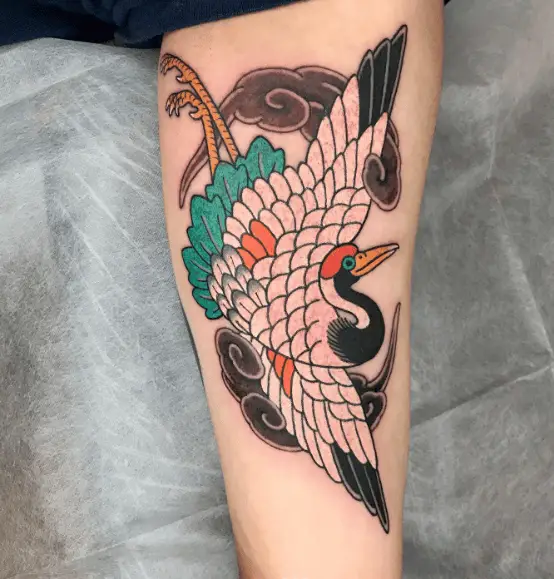
Image by @owen_yu_tattoos via Instagram
Peonies in Japanese culture are often associated with prosperity and luck, making it another good tattoo idea to bring a bit of fortune into your life.
A lot of the Peony tattoos that I've done actually have been a part of sleeves, with other Japanese flowers like Sakura blossoms being included in there - sakuras can represent transformation and change which together with a peony sends a message of seeking change and prosperity in your life.

Image by @jasonowenstattoo via Instagram

Image by @tanner_drake_tattoos via Instagram
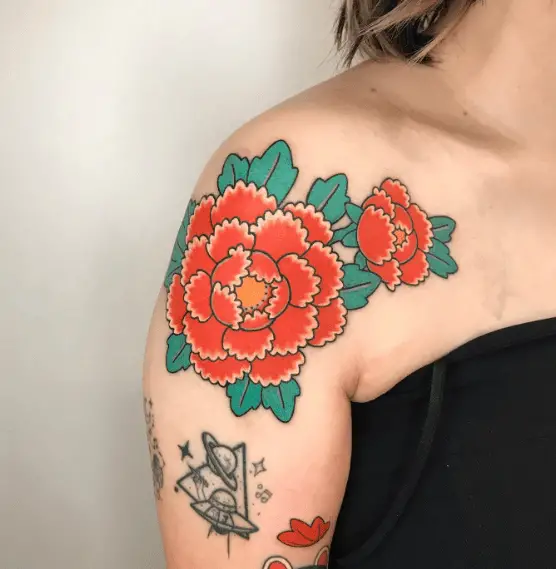
Image by @owen_yu_tattoos via Instagram
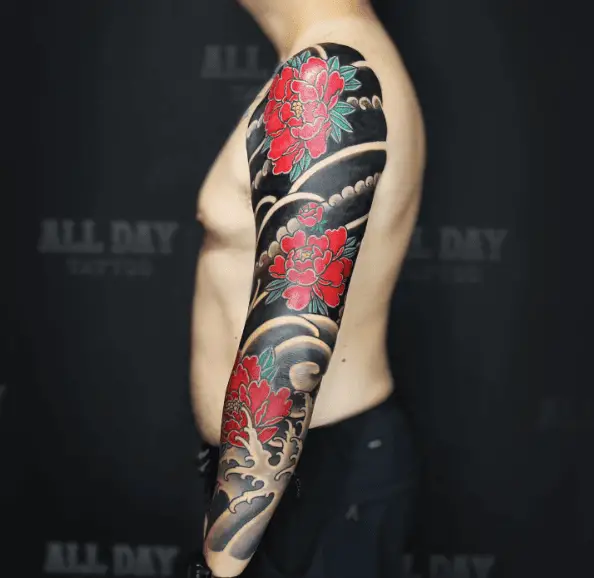
Image by @alldaytattoobkk via Instagram
I also have to mention a standalone cherry blossom tattoo. As I said, cherry blossoms are often associated with change and transformation, meaning they're a good tattoo idea if you want to showcase turning over a new leaf. I actually did this cherry blossom tattoo a few weeks ago for a client who moved countries and wanted to represent the major change in her life.
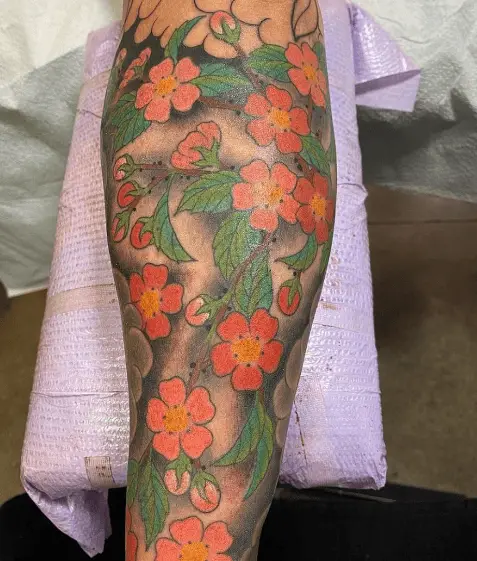
Image by @goldrushtattoo via Instagram
Similarly, snakes are also popular Japanese motifs for change. If that doesn't sound like a reason to get a snake tattoo, remember that they are also popular symbols for protection against diseases.
I'd say go for a sleeve if you're thinking of getting for a snake tattoo - you can have the snake stretch from the top of your arm or leg, making for a more eye-catching piece.

Image by @triplecrowntattoo via Instagram

Image by @yushitattoo via Instagram
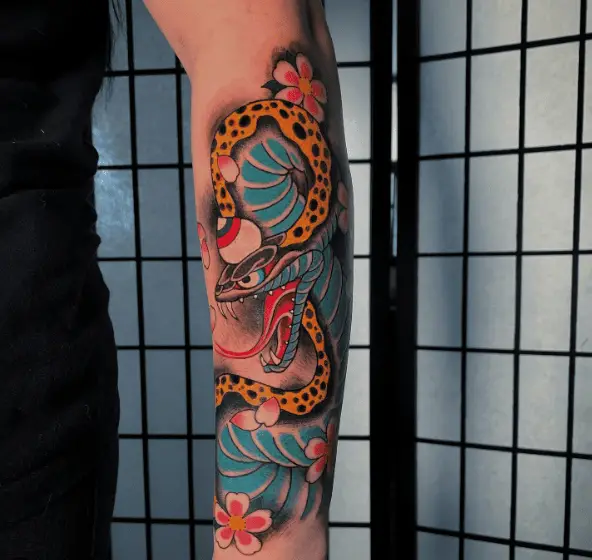
Image by @jasonowenstattoo via Instagram

Image by @threekingstattoo via Instagram
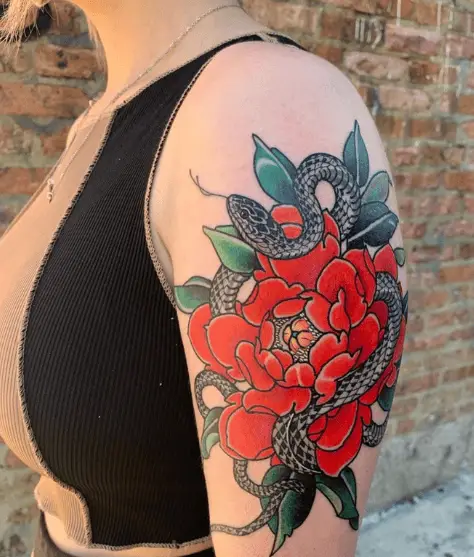
Image by @speakeasytat via Instagram
By far, the most famous Japanese painting has to be the Kanagawa-oki Nami Ura. It's incredibly iconic, and a key component of it is the waves at the center. You can pay homage to this work of art, as well as Japanese art and history by getting waves tattooed on.
Of course, instead of doing waves as a standalone tattoo, you can include other motifs in there. Personally, I think adding a yokai, or some cherry blossoms floating on the water would look really interesting.
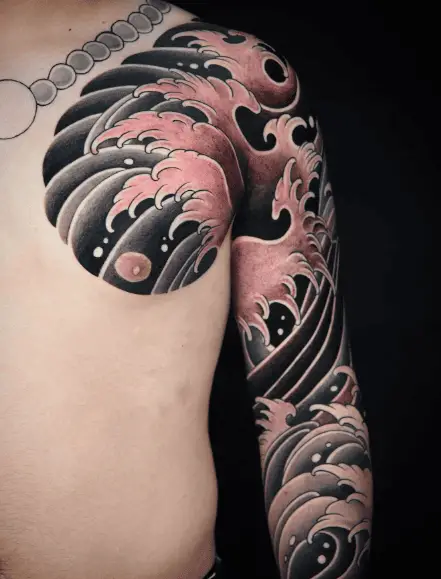
Image by @horiyotatt via Instagram
Tigers are fearless beasts, meaning that a Japanese tiger tattoo can be a symbol of both bravery and strength. On top of this, tigers are seen as symbols of protection in Japanese culture, so a tattoo of one can act as a guardian, always with you to keep negative energy at bay.

Image by @speakeasytat via Instagram
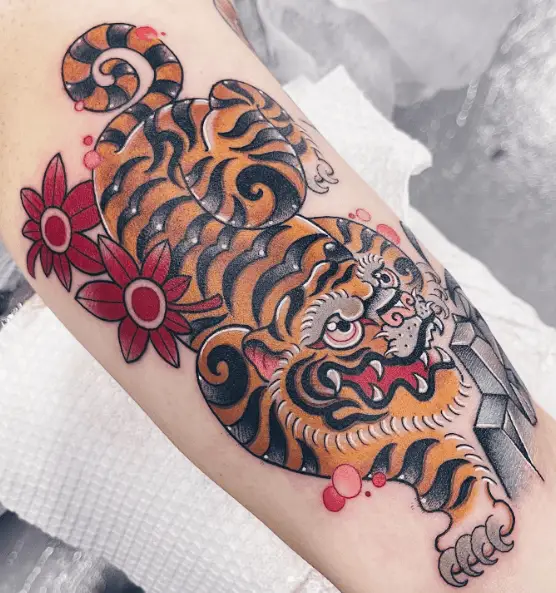
Image by @ngaiii via Instagram
In Japanese culture, the turtle is seen as a symbol of longevity and good health: they tend to live long lives sometimes over a century after all. As a tattoo, a Japanese turtle tattoo can showcase a want for a long, prosperous life.
What's more is that turtles have tough shells, acting as shields against predators. This also makes them the perfect tattoo design to represent a sense of resilience as well.
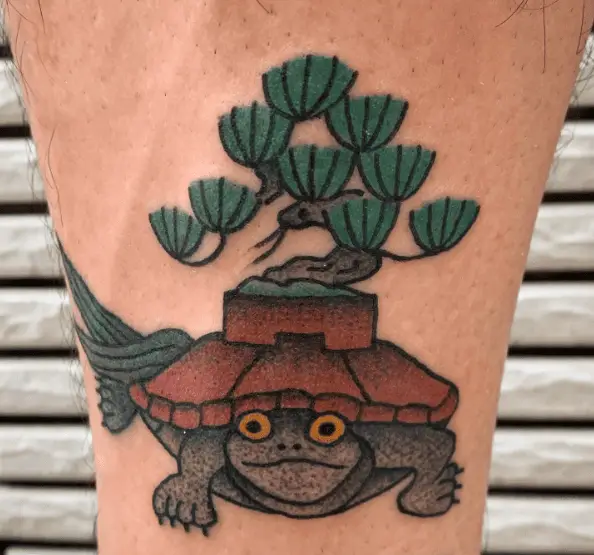
Image by @ via Instagram
The phoenix is all around a symbol of rebirth, so it'll be a good tattoo idea if you want to emphasize that you are changing things up in your life. I even recently did a phoenix in the Japanese style for a client because she had beaten cancer and felt reborn again!
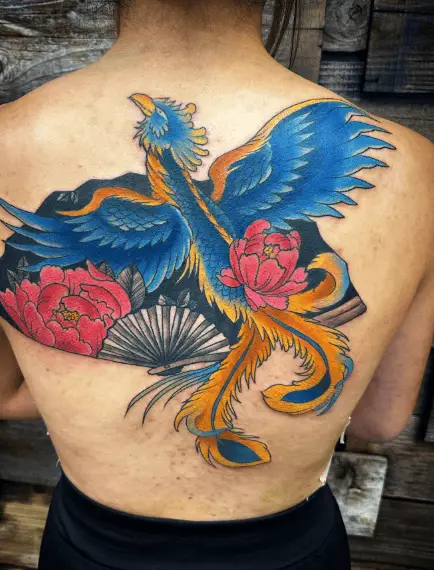
Image by @dc_tattoo via Instagram
The use of Hannya masks goes back to a Noh Theatre play featuring this young woman who becomes filled with so much rage that she becomes a vengeful demon. A Hannya mask tattoo can represent intense emotion, rage, and even seeking vengeance in your life.
Although the masks are often associated with rage and aggression, they're actually symbols of protection in Japanese history and culture too. You can definitely get one if you're more superstitious and want a more eye-catching tattoo that will keep negative energy out.
Hannya masks are really interesting motifs for body art since there are so many different ways to play with them - I actually did a whole article on different Hannya mask designs that you might like, if you want to check it out.
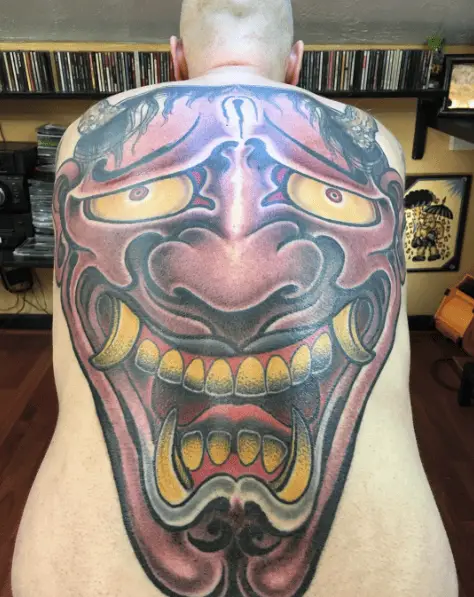
Image by @iamthecobra via Instagram

Image by @tattoosbymatt_ via Instagram

Image by @ via Instagram
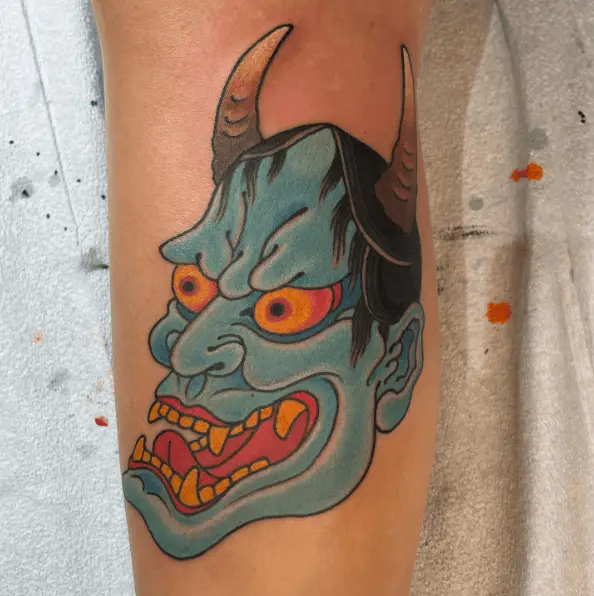
Image by @chrisgarver via Instagram
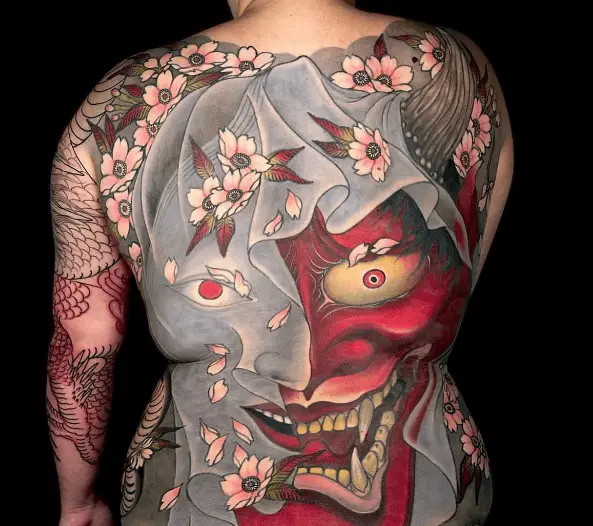
Image by @808tattoohawaii via Instagram

Image by @tildeathdenver via Instagram
When I think of Japan, Mt Fuji is one of the first things that come to mind. It's an unmistakable Japanese icon, being a world heritage sight as well. The site not only is a good idea for a tattoo to highlight your love for Japan, but Mt Fuji is also seen as this divine site for spirits and deities: by getting a Mt. Fuji tattoo, you can perhaps emphasize protection by these guardian spirits.

Image by @fetistattoo via Instagram
Geishas are a big part of Japanese history, being special artists known for their singing and dancing that traces back to a group in the 1200s. They're seen as symbols of purity and feminity, which may be traits you resonate with.
I feel like this would be a good time to mention what one of my clients did - they got a tattoo of a Geisha on their arm, with her wearing a Hannya mask. Hannya masks emphasize vengeance and intense anger, which contrasted against the purity of the geisha playing on the duality of emotions in a lot of people.
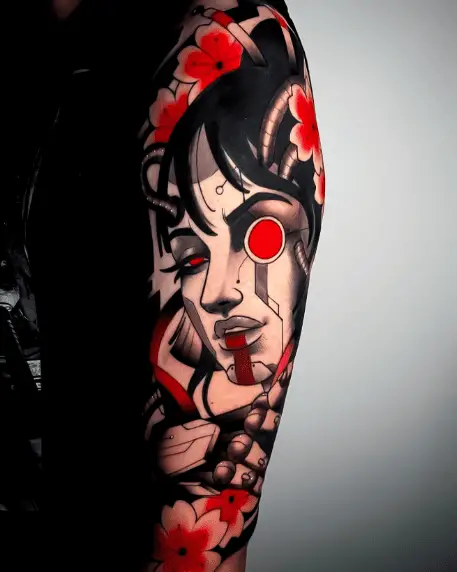
Image by @japanese.ink via Instagram
Kabuki is a type of Japanese theatre, with the actors a lot of the time wearing masks to convey emotions. If you feel like this sounds a lot like how Hannya masks originated, you're right. The Aoi no Ue play that the mask was from was a type of Kabuki play. All around, I think a kabuki tattoo would be a good idea to pay tribute to the theatre form since it's so rich in history and goes back hundreds of years.
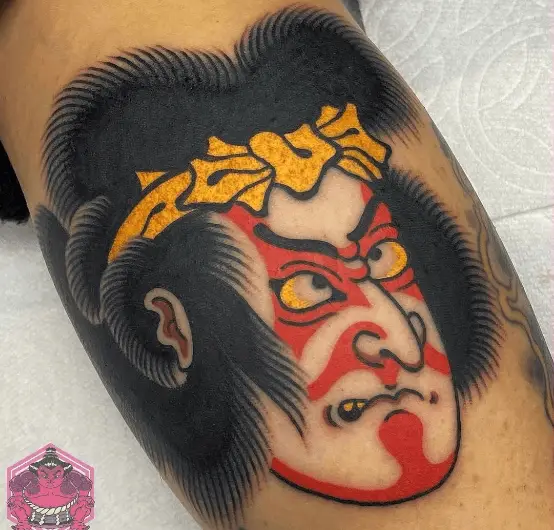
Image by @littletokyo via Instagram
I really like doing Japanese tattoos as sleeves, since Japanese tattoos, in general, are dramatic looking but so are sleeves. Like I said earlier, snakes and dragons work well for sleeves since they're long and serpentine, but you can go with any other motif that you want.
Now, there are 2 different types of sleeves that you can go for, a full and half-sleeve. Essentially, a full sleeve is a tattoo that stretches all the way from the top of your arm or leg to the bottom, while a half-sleeve sounds pretty much like its name: it's only half that of a full sleeve.
This goes without saying but half sleeves are more affordable than full sleeve options (they don't require as much work to do), meaning that they are the better choice if your budget isn't as big.
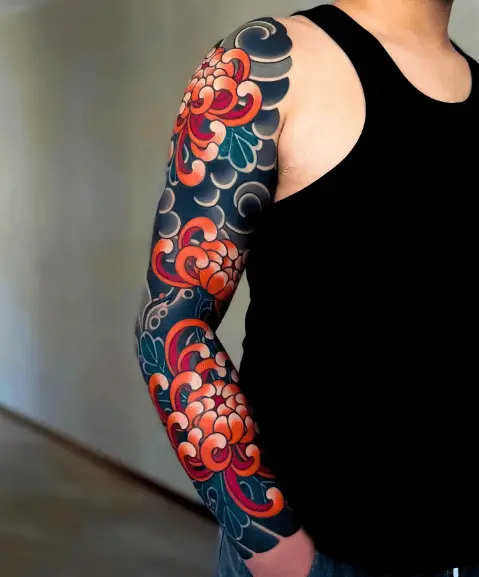
Image by @japanese.ink via Instagram
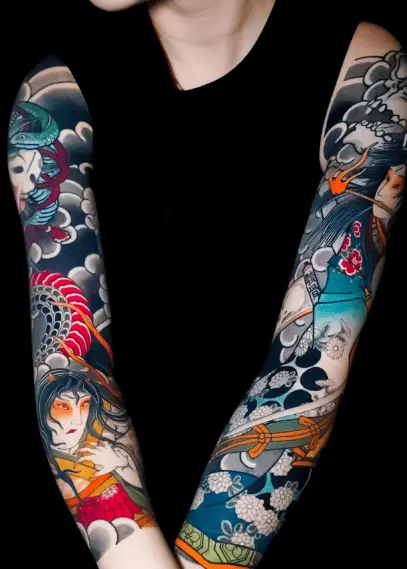
Image by @japanese.ink via Instagram
If Japanese tattooing means a lot to you, probably the best place to get your Japanese tattoo has to be your chest. You'd have it near your heart at all times. Just remember that the closer to your collarbone that you go, the more your tattoo will hurt. There's just a lot of thin skin and bone here.

Image by @obank_ink_tattoo via Instagram
If you want a Japanese tattoo but are interested in a more discreet location, you can always get your back tattooed. No one would be able to see your Japanese tattoo with a shirt on, which works great if you're someone who works in corporate.
The back is a rather big space, meaning you can go above and beyond with the amount of details you can add here. I've done a few Japanese tattoos where the client wanted their whole back covered, having the design almost go down to their buttocks.
But here's the thing:
Getting your spine area tattooed can hurt a lot. I've seen a couple of clients almost faint getting their spine area tattooed - there are just a lot of sensitive nerve endings here.
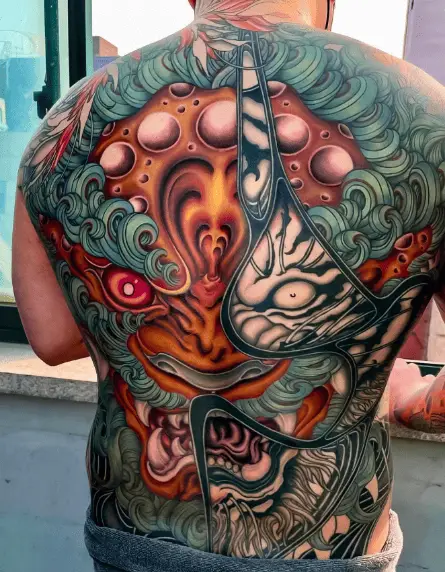
Image by @japanese.ink via Instagram
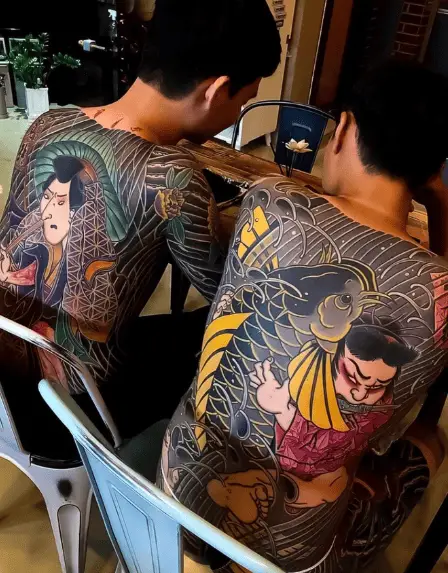
Image by @japanese.ink via Instagram
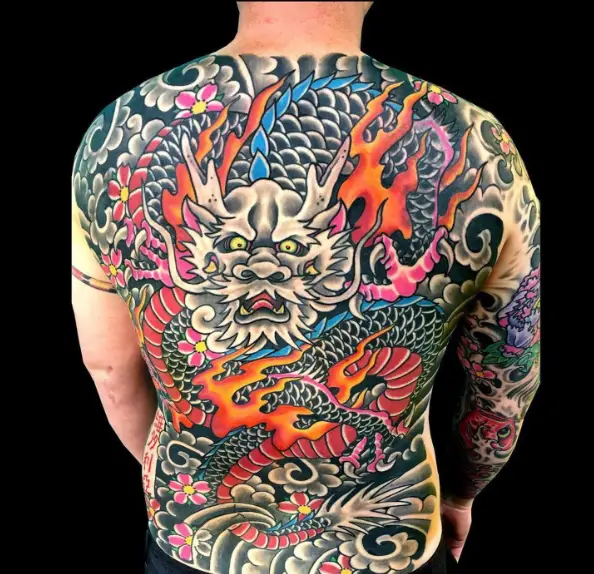
Image by @endlesssummertattoo via Instagram
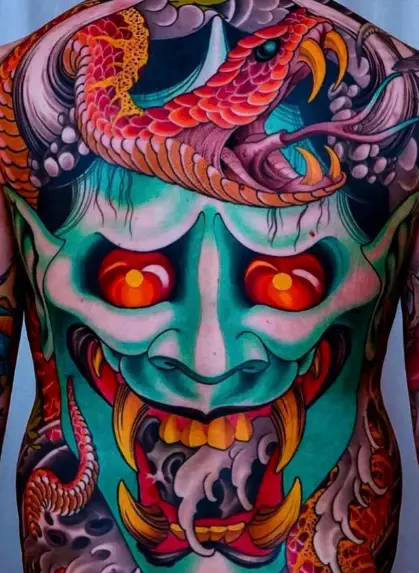
Image by @japanese.ink via Instagram
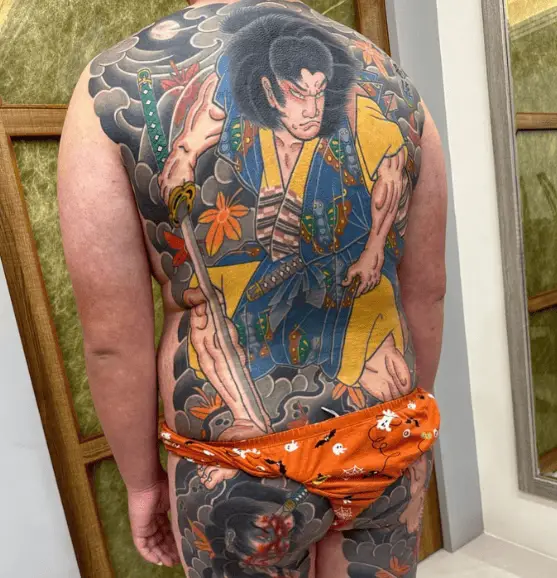
Image by @inkfromasia via Instagram
I of course have to mention fully body Japanese tattoos - they're one of the most extreme options on this list, but this might be something you're into. You pretty much will get a Japanese tattoo that covers almost your entire body.
Naturally, as you'll be covering such a large space, you'll have to add a few different Japanese motifs to cover up all that room. You can maybe do what I mentioned with the Koi fish turning into a dragon here, to use up quite a bit of that real estate.
Of course, you won't be able to get full-body tattoos done in one sitting. In our studio, it usually takes months, so definitely keep this in mind.

Image by @japanese.ink via Instagram
Last but not least, you can get a Japanese leg tattoo. Depending on where on your leg you're getting tattooed, there'll be a lot of space to work with, like your thigh.
Also, if you're a newbie who doesn't have the best pain tolerance, the upper outer thigh might be the best spot to get your Japanese tattoo. It's known to not hurt that much compared to other parts of the body.
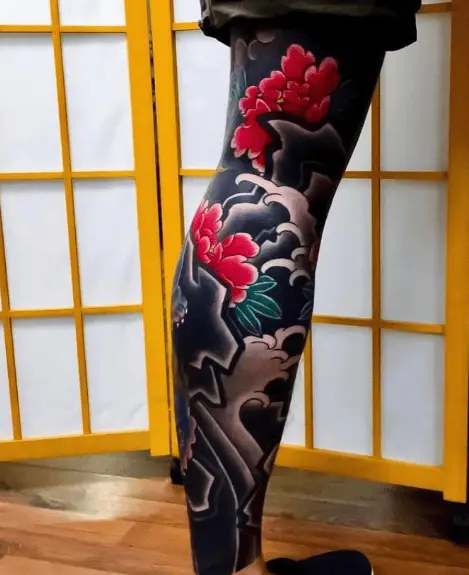
Image by @japanese.ink via Instagram
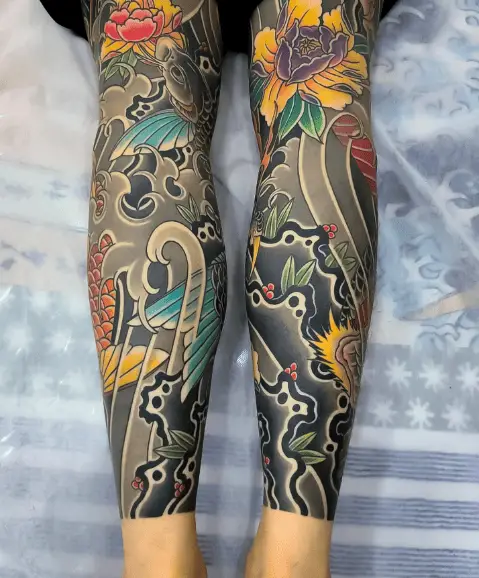
Image by @japanese.ink via Instagram
Traditional Japanese tattooing is also called Irezumi, and it's an ancient art form that goes back all the way to 300 BC. The style's pretty eye-catching, as it a lot of the time features dramatic coloring and lineart. Also, it almost exclusively incorporates Japanese motifs, like koi fish, cranes, and Hannya masks.
Choosing a Japanese-style tattoo can be a beautiful homage to its rich tradition, but it's essential to approach it with respect. To avoid cultural appropriation, do thorough research and understand the symbolism behind your chosen design. Collaborating with a tattoo artist experienced in Japanese styles ensures authenticity and respects the nuances of its cultural aesthetics.
Remember, mastering the art of Irezumi isn't just about getting a tattoo; it's about appreciating and honoring the profound history behind it. Always strive for an informed and respectful representation.
Japanese tattoos have always captivated me, from the fierce-looking Hannya masks and mysterious yokai to the graceful crane symbolizing prosperity. Whether you're considering a full-body masterpiece or a subtle nod to Japanese culture, this guide offers valuable insights and inspiration for your next tattoo.
But here's the thing - with such rich cultural significance, it's crucial to understand these symbols before inking them. Always do your homework and pick a tattoo artist well-versed in Japanese designs. After all, it's not just a tattoo; it's a piece of history and culture!